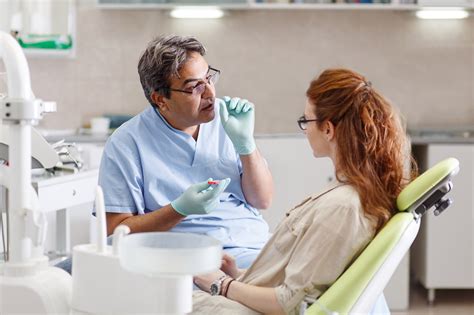An orthodontist is a dental specialist who focuses on diagnosing, preventing, and treating misalignment of teeth and jaws. Orthodontic treatment can improve oral health, aesthetics, and overall well-being.

Orthodontic Services
Orthodontists provide a comprehensive range of services, including:
- Braces: Traditional metal braces or clear aligners (e.g., Invisalign) to correct malocclusions (incorrect bite).
- Retainers: Appliances used to maintain the results of orthodontic treatment.
- Space maintainers: Devices to preserve space in the jaw for erupting teeth.
- Orthognathic surgery: Surgical procedures to correct severe jaw misalignments.
- TMJ (Temporomandibular Joint) disorders treatment: Addressing jaw pain and movement problems.
The Role of Orthodontists
Orthodontists play a crucial role in maintaining and improving oral health. They:
- Prevent and Diagnose Dental Problems: Identify and address potential orthodontic issues early on to prevent more severe problems.
- Enhance Oral Function: Correct misaligned teeth, improving chewing, speech, and airway function.
- Boost Self-Confidence: Straighten teeth, improving appearance and self-image.
- Reduce Pain and Discomfort: Alleviate pain and TMJ disorders caused by orthodontic problems.
- Improve Overall Health: Identify and treat airway issues related to orthodontic problems, such as sleep apnea.
Common Orthodontic Concerns
Orthodontists address various orthodontic concerns, including:
- Crowded teeth: Insufficient space in the jaw for all teeth.
- Overbite and underbite: Vertical misalignment of upper and lower teeth.
- Crossbite: Misalignment of teeth when biting, leading to uneven wear.
- Spacing issues: Gaps between teeth due to missing or abnormally small teeth.
- Impacted teeth: Teeth trapped below the gum line due to insufficient space.
The Benefits of Orthodontic Treatment
Orthodontic treatment offers numerous benefits, such as:
- Improved oral hygiene: Properly aligned teeth are easier to clean, reducing plaque accumulation.
- Reduced risk of cavities: Straight teeth have fewer gaps and less plaque accumulation, reducing the risk of cavities.
- Enhanced chewing function: Correctly aligned teeth improve chewing efficiency, supporting overall digestion.
- Improved speech: Misaligned teeth can affect speech clarity, which is addressed by orthodontic treatment.
- Boosted self-esteem: Straighter teeth enhance appearance, improving self-confidence.
The Importance of Professional Orthodontic Care
Seeking professional orthodontic care is crucial for optimal oral health and aesthetics. Orthodontists undergo extensive training and possess specialized knowledge in diagnosing and treating orthodontic problems. They:
- Provide Personalized Treatment Plans: Tailor treatment to each patient’s unique needs and goals.
- Use Advanced Techniques: Utilize the latest advancements in orthodontic technologies and materials.
- Monitor Progress Closely: Regularly evaluate treatment progress to ensure desired outcomes.
- Address Root Causes: Identify and address the underlying causes of orthodontic problems, ensuring long-term stability.
- Offer Long-Term Support: Provide ongoing care and support to maintain the results of orthodontic treatment.
Conclusion
Orthodontists play a vital role in maintaining and improving oral health and aesthetics. Their expertise in diagnosing and treating orthodontic problems enhances oral function, reduces pain and discomfort, and boosts self-confidence. By seeking professional orthodontic care, individuals can achieve optimal oral health and a beautiful smile.
Pain Points and Motivations
Pain Points:
- Difficulty cleaning teeth due to misalignment.
- Embarrassment about crooked teeth.
- Pain and discomfort caused by misaligned jaws or impacted teeth.
- Concern about future dental problems.
Motivations:
- Desire to improve oral health.
- Aspiration to enhance appearance.
- Relief from pain and discomfort.
- Prevention of future dental issues.
Effective Strategies
Effective Strategies for Orthodontists:
- Educate patients about the importance of orthodontic care.
- Offer a range of treatment options to meet patients’ needs.
- Use innovative technologies to enhance treatment effectiveness.
- Provide personalized treatment plans to optimize outcomes.
- Monitor treatment progress closely and make necessary adjustments.
Effective Strategies for Patients:
- Seek regular orthodontic checkups to identify potential problems early on.
- Follow orthodontic instructions carefully to ensure optimal treatment outcomes.
- Maintain good oral hygiene to support orthodontic treatment.
- Address any concerns or questions promptly with their orthodontist.
Common Mistakes to Avoid
Common Mistakes Orthodontists Should Avoid:
- Overpromising treatment outcomes.
- Failing to provide clear and concise treatment plans.
- Neglecting to address underlying causes of orthodontic problems.
- Using outdated or ineffective treatment methods.
Common Mistakes Patients Should Avoid:
- Skipping orthodontic appointments.
- Not following orthodontic instructions properly.
- Consuming foods or drinks that can damage orthodontic appliances.
- Failing to maintain good oral hygiene during orthodontic treatment.
Additional Resources
- American Association of Orthodontists (AAO)
- National Institute of Dental and Craniofacial Research (NIDCR)
- Orthodontic Products’ Online (O|P Online)
- Journal of Orthodontics
- International Journal of Orthodontics
